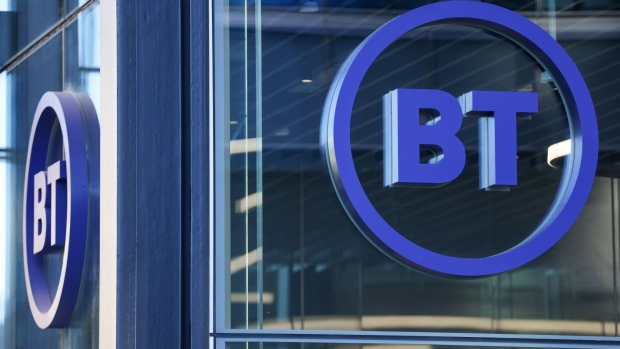Mar 21, 2023
BT Accused of Stifling Competition by Broadband Network Rivals
, Bloomberg News

(Bloomberg) -- BT Group Plc has been accused by smaller rivals of threatening competition in Britain’s broadband market, with one calling for a full breakup of the former state monopoly.
London-based BT owns the UK’s only national wholesale broadband network, Openreach. It also sells broadband through that infrastructure, a combination that raised competition concerns from Ofcom and led to Openreach being legally ring-fenced from its parent in 2017-18.
Openreach has proposed a new pricing structure for internet service providers to use its network, dubbed Equinox 2. Regulator Ofcom had provisionally approved the offer but last week it extended its review.
While big internet providers including Vodafone Group Plc, Comcast Corp.’s Sky and TalkTalk Telecom Group Ltd. supported the price offer, rival networks slammed it in submissions to the regulator, published Tuesday, saying it could undercut them.
An association of alternative networks called Inca said the proposals should be blocked as they will “starve” them of demand and hurt investment and competition in the UK market.
Nexfibre — a new company half-owned by Openreach’s biggest rival network Virgin Media O2, and half-owned by InfraVia Capital Partners SAS — said BT was trying to “re-monopolize” the market.
Fern Trading Group Ltd., an investment group which owns 200 businesses including Vorboss and other smaller networks, said “it should be clear to Ofcom that the primary objective of Equinox is to undermine alternative network build.”
‘Competition Is Good’
Private equity and infrastructure funds have poured billions of pounds into more than 100 startups trying to build fiber networks to rival Openreach, such as CityFibre, backed by Goldman Sachs Inc., Hyperoptic, backed by KKR & Co. Inc., and Community Fibre, backed by Warburg Pincus LLC.
Read More: Liberty Global and CityFibre Said to Discuss UK Fiber Deals
A spokesperson for BT said it has “always believed that competition is good for customers, which is why we wrote to Ofcom to clarify this in February.”
An Openreach spokesperson said “we continue to share Ofcom’s initial view that our full—fiber pricing offer isn’t anti-competitive, and it’s important the regulator has time to consider all the feedback it has received fully and fairly.”
Although TalkTalk supports the pricing offer, its chairman Charles Dunstone said Ofcom often needed to be more strict with Openreach, adding that Britain’s “rather misguided regulatory regime” risks squandering the chance to create a competitive market of fiber networks.
“There’s a dawning that the market’s probably going to go back to where it was 25 years ago,” said Dunstone, who is also one of TalkTalk’s biggest shareholders. “There will have been enormous possibility and potential, and billions and billions of wasted pounds.”
Split
The legal split between BT and Openreach completed in 2018 may not have gone far enough, according to the CEO of London challenger network Vorboss.
“We see it being more imperative now that we have the genuine split between BT and Openreach,” Tim Creswick said in an interview.
Read More: BT Challenger Netomnia Raises $280 Million Debt for Fiber Build
An Ofcom spokesperson said alternative networks are a “vital part” of its strategy for better broadband.
“We keep a close eye on Openreach to make sure it doesn’t use its position to distort competition,” they said, pointing to their Openreach Monitoring Unit, whose next report on the separation is due in June. “If we see evidence of any company acting in a way that distorts or prevents competition, we won’t hesitate to step in.”
©2023 Bloomberg L.P.





